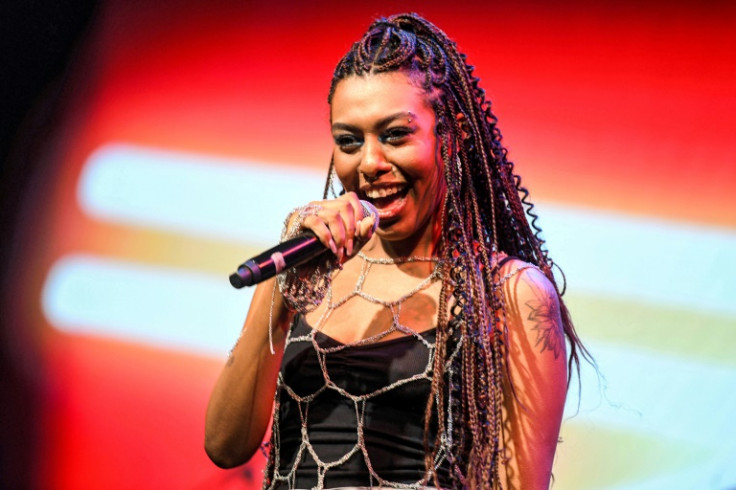Egypt's Women Rappers Fight For Place In Rising Scene

Egyptian rapper Dareen is a whirlwind of sharp verses and curly hair on stage, bringing the Cairo crowd to its feet and a fresh perspective to Egypt's male-dominated rap scene.
Her raps flow over eclectic beats inspired by her childhood in Alexandria, the coastal city home to many of Egypt's biggest rap stars, including the massively popular Wegz, a male rapper on a rapid rise after a 2022 World Cup performance in Qatar.
In Alexandria "we make art, but in Cairo, it's a whole industry", Dareen, 21, told AFP, her bright pink nails protruding from fingerless leather gloves.
And the industry is booming. In 2022, Wegz was the most streamed Arab artist in the Middle East and North Africa on the music platform Spotify.
"The impact of rap can be seen in our charts, our wrapped data and in all key cultural events," said Mark Abou Jaoude, Spotify's Head of Music for the Middle East, North Africa, and South Asia.
Last year, 60 percent of Spotify's most-streamed Arab artists were in the hip-hop genre, which includes rap.
"We're also witnessing an increasing number of rap artists touring Europe and the United States, which serves as evidence of how fans worldwide, including diaspora communities, are connecting with the genre," Abou Jaoude said.
For a long time, Egyptian rap had "an underground status", according to music researcher Amr Abdelrahim.
But now party boats on the Nile River in Cairo blast Wegz through the Egyptian capital, and rappers are getting multinational advertising deals.
"The professionalisation of their craft has impacted how they make music and the verses they write, but also their dreams," said Abdelrahim.
"This is the first generation that's seeing their elders make big money from rapping."
And the genre's women performers -- out of the spotlight for years -- are vying for a piece of that success.
Dareen's own song Leila -- which talks about her disappointment with fellow artists -- has close to 180,000 views on YouTube.
Although Cairo's line-ups increasingly feature women rappers donning stylish streetwear for larger-than-life performances, there is still a class divide for them to cross.
Far from the working-class African American communities where rap was born half a century ago, the Egyptian version and its audience are still "on the margins, because they're middle and upper class, while 'Mahraganat' is much more popular", said Abdelrahim.
Mahraganat, which is widely popular in Egypt where it is known as 'electro-shaabi', has become musical shorthand for Egyptian youth expression.
"You need only walk around Cairo" to hear it, Abdelrahim said.
In "all the tuktuks, all the stores, what you hear" is Mahraganat, with its mix of synthesised beats, traditional instruments and blunt lyrics celebrating manhood, power and money.
An easy creative choice for rap's rising women is to try to imitate that same machismo, but their lyrics seem to cast a wider net.
In her latest album "Kawabes", or nightmares in Arabic, Dareen raps about "the depression and mood swings" that "follow break-ups".
Stepping off stage to raucous applause, she says she wants to talk about "everything", uncensored, even her most vulnerable moments.
But rapping as a woman is an uphill battle on multiple fronts.
"Claiming our freedom as rappers is hard, whether from our families or from society," Dareen said, adding that the industry is "far from peaceful" and harsh on women.
"We're not taken seriously, they think we don't have problems when it's the exact opposite, especially here in Egypt where we're forced to deal with harassment and constant obstacles."
Egypt's conservative, deeply patriarchal society causes most women to shy away from professions in the public eye.
And in the macho world of rap, "to evolve, you have to frequent the same places, to integrate into the networks of artists and producers, an exclusively male world," Abdelrahim said.
While more women are stepping into the genre's spotlight, they have come mostly from more well-to-do echelons of Egyptian society.
According to Abdelrahim, almost all women rappers come from the upper class, where girls and women generally enjoy more freedom with less fear of social stigma.
"You can see more social diversity in the male rap scene," Abdelrahim said, where artists fire insults at those from privileged upbringings versus their own working-class backgrounds.
Their women counterparts, meanwhile, walk a tightrope between rap's boastfulness and the modesty demanded by society, side-stepping American hip-hop's brand of sexuality entirely.
"Assuming an overtly sexual femininity" -- like women rap stars Cardi B or Megan Thee Stallion -- "is not possible" if the performers want to be seen as worthy of respect, said Abdelrahim.
"Because ultimately they're judged by both society and their families."

© Copyright AFP 2025. All rights reserved.





















